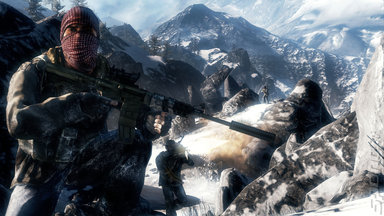Recently, Electronic Arts Medal of Honor faced the wrath of war time USA, when it was essentially forced to change the option for gamers to play as the 'Taliban' after protests from military personnel and family of servicemen, among others.
 |
| Member of the 'Opposing Force' in Medal of Honor |
Those who protested the inclusion of the term 'Taliban' make a point. It hits close to home for those who have lost loved ones to the war in Afghanistan or who live with the knowledge that it's always a possibility. But that's only from the American point of view. Let's face it, political issues determine much of the content of military games. Certainly in Medal of Honor's case.
Arabs (and all non-whites) have the tendency to be typecast in American media - they are usually the terrorist. That this is nothing new only compounds the problem because it doesn't seem to be going away. The bulk of console games (and developers) are produced in the West, so they are designed with Western sensibilities, perspective and markets in mind. Fair enough. But the gaming world is well....the world. Do the heroes have to be portrayed by Western, and usually white, characters?
Take Dead Space 2 - no doubt one of my favourites and I wouldn't change a thing about the characters. But for arguments sake; it's set in space in a fictional place and time. Race, nationality or ethnic origin can't be that much of a factor can it? Would it matter if Isaac Clarke was Ahmad Abdullah or Rajiv Singh? Now that I've said it out loud...maybe it would.
It may be a self-perpetuating cycle. The constant affirmation of stereotypes make it difficult for us to accept anything outside of them, and perhaps an Indian superhero or Arab 'good guy' is just too unbelievable. As it is, minority groups must justify their presence in Western media through their minority status. A black guy must be, well black and 'ghetto', an Arab must be a terrorist and a Chinese guy a Karate expert.
An interesting article in the LATimes looked at the issue of Arab stereotyping in the US which increased post 9/11, and cited the frustration some Arab Americans feel regarding the narrow range their ethnicity attracts. But in the gaming world the voice is what matters - race may not have to be an issue regarding finding work. But the issue here isn't so much work as it is perception.
The big question: How does the Arab world feel about all this? Your turn.
Well, this is one of my school projects in English class, 11th grade. As a Lebanese person, I do not feel much racism targeted towards me, but I have noticed that in most of my life so far playing games, i have noticed that the enemies are almost all of the US. enemies of past wars, like you said, Japanese, Russians, Arabs etc... This does not stop me from playing the games, but makes me wonder why the United States always wants power, whether it's in real life or even in shooting games, they always want to be 1st and dominate over everyone else.
ReplyDeleteThat's a great point!
ReplyDeleteGames are usually written from the American perspective where they are the hero and some former enemy is the 'bad guy'.
How do you America would respond if it was portrayed as the enemy?